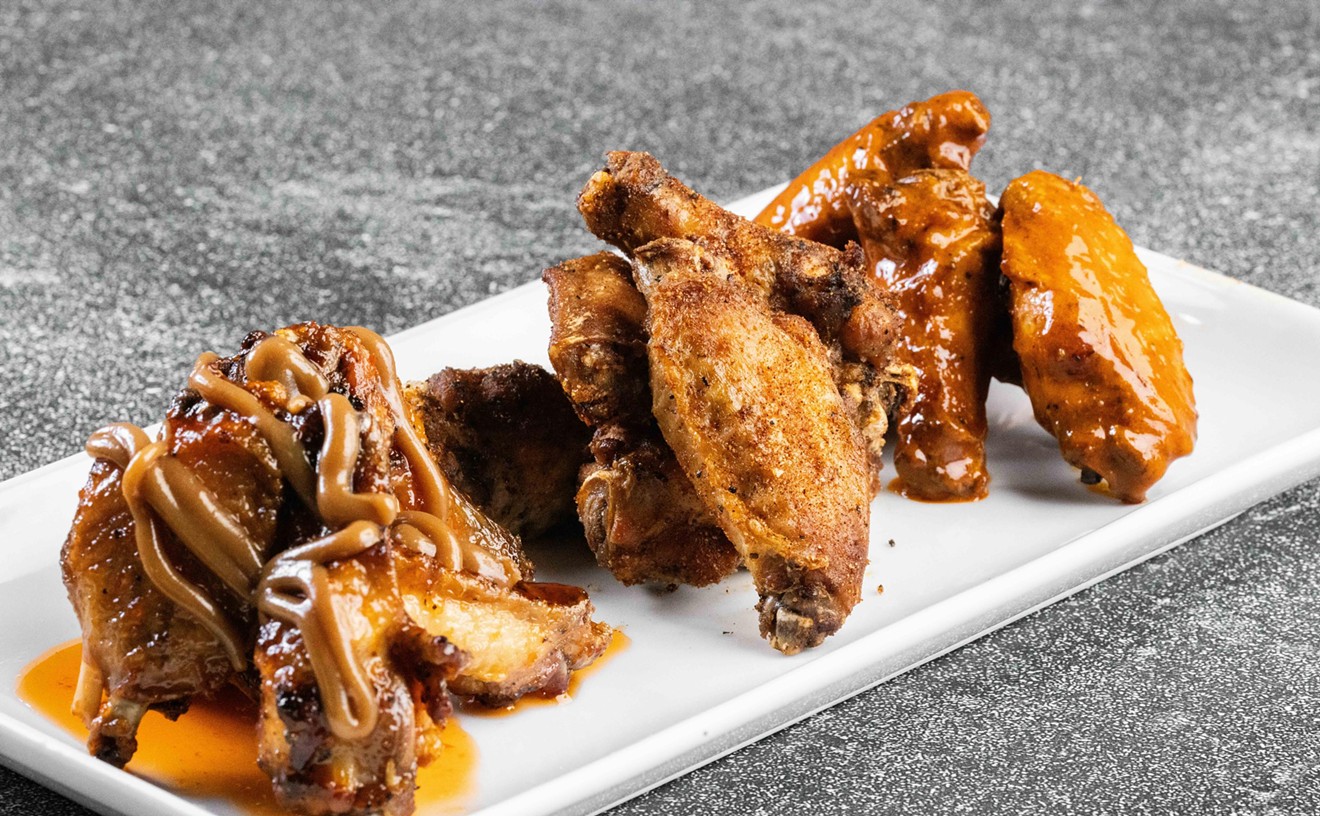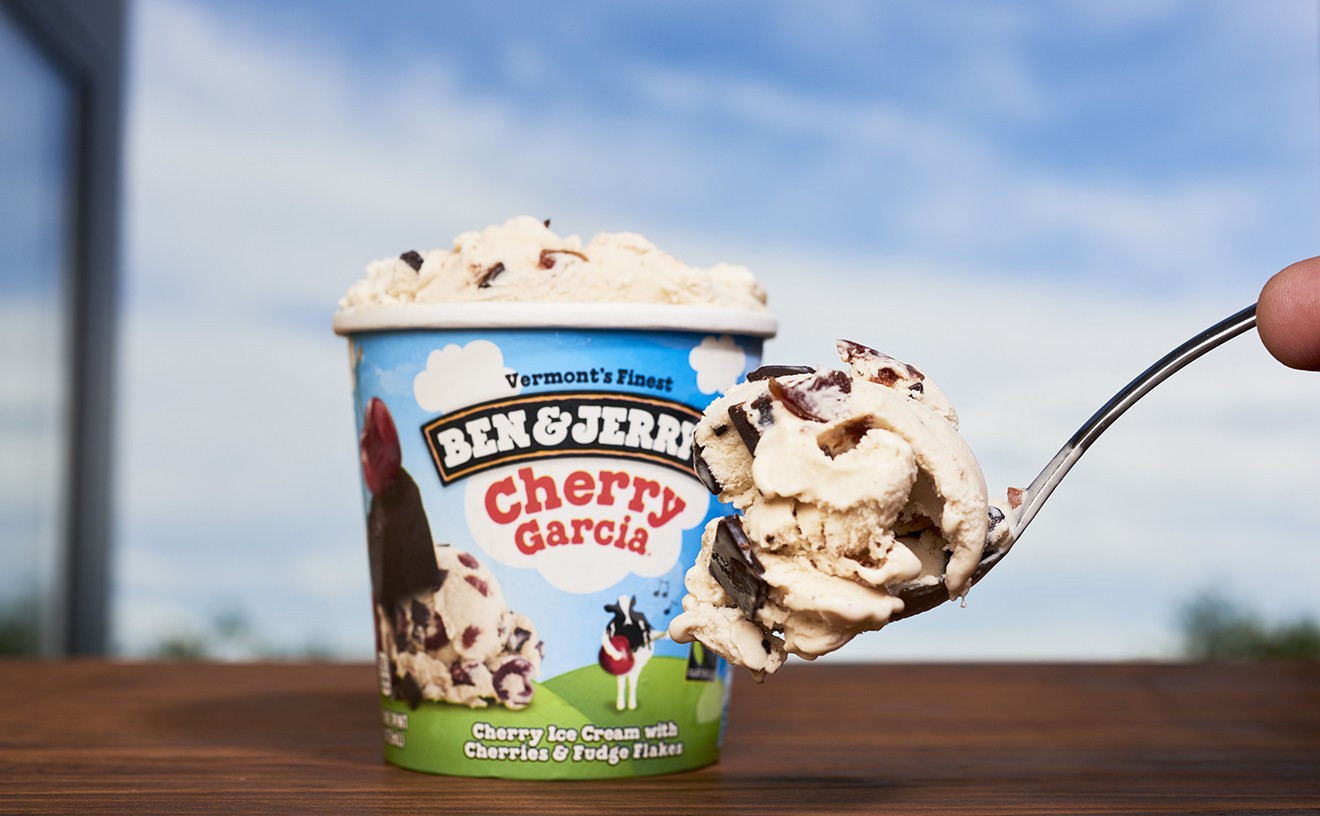Dining in a blur is different from eating in the dark, where you can pester the sommelier for a flashlight so you can see where the decimal point falls on your wine selection and avoid inadvertent financial ruin. But a light is no use in a blur.
Tres Méridas has zigzagging strips of tiny amber lights serrating the ceiling. Someone may have thought they were good stand-ins for constellations or marquee fringe, but they are of no use in a blur. To compound this infirm illumination, Tres Méridas prints its menu on ivory paper with the edges decoratively singed. On this paper is sprinkled fussy script type--in brown. The only way we could decipher it, neatly tucked between covers made of genuine wood, was to huddle at a vacant wait station under a generous beam of white light. This is not a good thing to force your customers to do. You want to make it as easy as possible to separate them from their scratch, not give them migraines.
Before you plunge into this illegibility, heed these words of advice: Skip the margaritas. They're heinous. They're watery. The tequila is cheap and rank, more resembling industrial fungicide than a brutal sobriety exterminator. Instead, when you visit Tres Méridas, the best thing you can do is have your meat pulled. This isn't as crass as you might think.
Like all good tugs, pabellón criollo is hand-pulled. It said so right on the menu under the glare of wait-station lights. Pulled beef is marinated in orange juice with a little cilantro and achiote. It's beautifully sculpted, though it does look a little like a geological core sample wading in a puddle of spent motor oil. The bottom layer is herbed white rice, while the midlayer is beef shreds dabbed in a little tomato sauce. The primary sensual pleasure in dishes like this is in the rhythm of the chew; in the way the shreds behave between the teeth, how they brush the surface of the tongue as it knocks the mush wad around like a paddle ball.
Of course, this strain of pleasure can easily collapse if the beef is sapped of moisture and leached of flavor. But here, the citrus tenderizes the meat and makes it juicy while it highlights the natural beef sweetness. Achiote secretes a musky earthiness that broadens the flavor dimension. Crowning the disc is a tiling of glistening plantain slices ringing a sprig of rosemary. Rice grains soak in a pool of smooth black-bean sludge blistered with white cheese at the bottom.
Yanked from the Yucatán is cochinita pabil, pulled pork shoulder marinated in sour orange juice and achiote before it is slow-cooked. Like flesh pulled from chicken, "the other white meat" is a blank slate, absorbing whatever seasoning you embed in the fibers. It's served in a banana leaf with bright pink rings of pickled red onion, making for soothing visuals, and it offers the same sensual chewing pleasure--even more so since the pork doesn't have the distinctive meat flavors to distract the taste buds.
Aesthetic plate compositions at this "Latin Affair" don't sprout out of nowhere. This Frisco restaurant, fashioned out of wood, stone and faux brickwork to resemble a Latin open market, was originally conceived as a restaurant/art gallery. But city regulations put the kibosh on that ambition. So now the 20 or so paintings slated for the gallery hang from walls in the dining room, bar and restrooms.
Tres Méridas is based on a piece of geographical trivia. The Latin countries of Spain, Mexico and Venezuela each have cities that go by the name of Mérida. In Mexico, Mérida is the capital of Yucatán. In Spain, Mérida rests in the Badajoz province in the region of Extremadura on the north bank of the Guadiana River. It was founded by the Romans in 25 B.C. as Augusta Emerita. In Venezuela, Mérida is the capital of the state of the same name in the western part of the country lying entirely in a portion of the Andes known as the Cordillera de Mérida. At 5,384 feet, it is the highest city in Venezuela.
In the restaurant these cities and their cultural roots merge loosely. Three coats of arms from each serve as the logo, which is screened back on the menu, adding more gusto to the blur. The three nations dominate the menu and wine list (save for Mexico on the latter, but that's where tequila comes in). From Mexico there are tacos de pollo and enchiladas. From Venezuela there are chupe de pollo (a chowder) and pastiche (a pasta). From Spain there are paella and tortilla Española.
The latter exposes a flaw in Tres Méridas' kitchen. This tart, composed of egg, onion and potato and dribbled with herb aioli, arrived stone cold, save for the edges and the points of the wedges, which were piping hot. We returned it for a retry, and it arrived as spud lava--too hot to eat. This kitchen appears to make assiduous use of microwaves.
Enchiladas verdes a rojas could have suffered a shot of micro-beams, too. Fashioned out of "crunchy" chicken and slathered with salsa crowned with sour cream and cheese, the tortilla sheath was stiff, as were the innards.
As our meals progressed, we feared stiffness would become an overarching theme, instead of pulled meat in a blur. And when rigidity runs rampant in a dish like ceviche, the torrent of horrors can be unnerving. It arrived in a thick tall glass. The bleached-white meats--snapper, shrimp, calamari--contrasted sharply against the deep red of the thick tomato sauce that soaks them. But rather than being "cooked" in a citrus acid bath, the seafood was most likely poached before it ever saw a splash of lime. Shrimp were hard and bland. The calamari was stiff and chewy. The snapper was brittle with sharp corners. "It was like canned ceviche," complained one of my dining companions. "I think the whole restaurant is preprocessed."
Now that assessment is rash, but it's hard to get around the impression Tres Méridas leans a little heavy into shortcuts. Salmon Latino, an oregano-seasoned and grilled fillet studded with capers and drenched in butter sauce, was also rigid and brittle, breaking into dry crumbles instead of flaking into moist sections.
Yet other dishes worked to dispel the notion. Plato de pinches combinados, a collection of bell pepper- and onion-infested pork, beef and chicken skewers, features juicy and tasty pieces of meat. Tortilla soup was thick, rich and hearty, and not overly punched with pepper.
Yet the biggest surprise was the pasticho, a Venezuelan pasta composition that resembles a slab of lasagna. Despite its rustic pedigree, a breed that simultaneously flaunts ground beef and ham, the dish is delicate, even elegant. Its crown is a luxuriously smooth béchamel sauce with mozzarella and Parmesan cheeses.
So not everything here is hard and brittle; not everything sports bizarre temperature extremes; not everything demands that you squint and scrunch to focus. Then again, blurs are not uncommon when the forte is pulled meat.
2809 Preston Road, Suite 1200, Frisco, 972-334-0937. Open 11 a.m.-10 p.m. Sunday-Thursday; 11 a.m.-11 p.m. Friday & Saturday. $$










